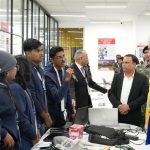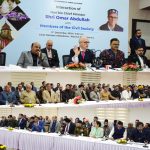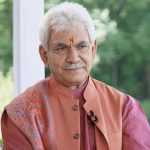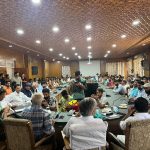Srinagar, Dec 11: Prime Minister Narendra Modi virtually interacted with young innovators during the 7th edition of the Smart India Hackathon (SIH) 2024 Grand Finale, including participants from NIT Srinagar. This marks the first time NIT Srinagar is hosting the grand finale, which began on Wednesday as one of 51 national centers.
PM Modi engaged with teams, including the SIH team from BMS Institute of Technology, Bangalore, and praised Mohammad Ali Mohammad Al from Yemen, highlighting India’s diverse culture. Over 1,300 student teams participated in this nationwide event. Union Minister for Education, Dharmendra Pradhan, virtually inaugurated the event, emphasizing the transformative role of education in fostering innovation and building an Atmanirbhar Bharat.
NIT Srinagar’s Director, Prof. Binod Kumar Kanojiya, the Chief Guest, emphasized the institute’s commitment to excellence and its role in bridging academic learning with real-world problem-solving. He highlighted NIT Srinagar’s dedication to nurturing innovation and preparing students for a tech-driven future.
Chairman of the Core Committee for SIH 2024, Prof. G.A. Harmain, welcomed 25 exceptional teams from 21 states, noting their potential to shape India’s future through technology. Pratap Sanap, Nodal Head for SIH, discussed the hackathon’s importance in fostering innovation and collaboration.
A formal vote of thanks was given by Prof. Atikur Rahman, Registrar of NIT Srinagar, who commended the organizing team for making the event a success. NIT Srinagar is now a hub for innovation, hosting 25 teams from across India to develop real-world solutions.
The inauguration featured a traditional Lamp Lighting and Isbandh Ceremony, symbolizing knowledge and purity. The event also included speeches by Dr. Abhay Jere, Vice Chairman of AICTE, and Prof. T.G. Sitharam, Chairman of AICTE.
This year’s edition of SIH saw a 240% increase in internal hackathons, growing from 900 in 2023 to over 2,247 in 2024, making it the largest edition to date. More than 86,000 teams participated at the institute level, with about 49,000 advancing to the national rounds. The hackathon tackled 250 problem statements from 54 ministries, departments, state governments, PSUs, and industries across 17 key sectors, including healthcare, sustainability, education, and agriculture.








